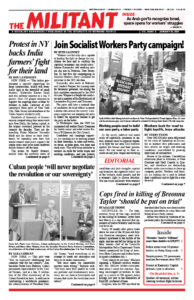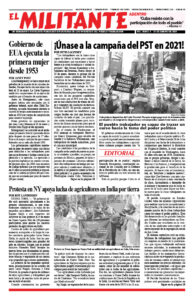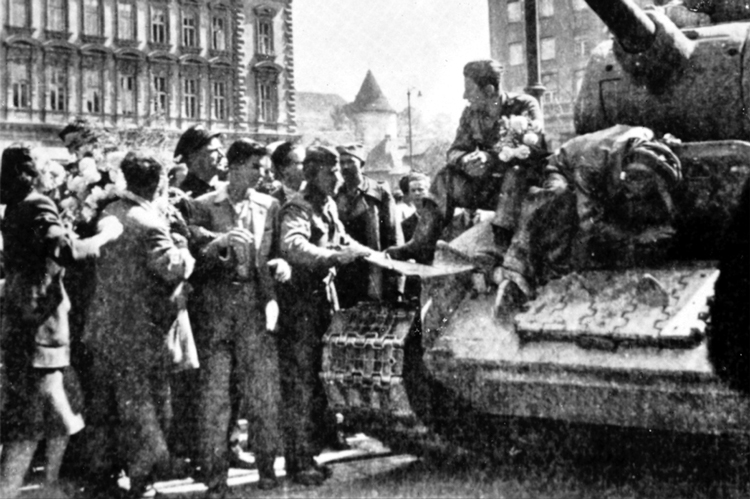The Truth About Yugoslavia: Why Working People Should Oppose Intervention by George Fyson, Argiris Malapanis and Jonathan Silberman is one of Pathfinder’s Books of the Month for January. The contents first appeared as articles in the Militantbetween April and October 1992. The book was used by Socialist Workers Party members to build working-class opposition to the U.S.-led imperialist interventions in the crumbling workers state of Yugoslavia, as Washington acted to gain the upper hand over its European rivals. The ruling Stalinist bureaucracy shattered along warring nationalist lines as it increasingly vied to become rival gangs of capitalist exploiters. The excerpt is from the introduction. Copyright © 1993 by Pathfinder Press. Reprinted by permission.
BY GEORGE FYSON
As this book goes to press, Washington is preparing to go to war in the former Yugoslavia. Its declared plans include air attacks on bridges, roads, and military positions of the rightist forces in Bosnia linked to the Serbian regime in Belgrade.
Washington has also declared its intention to send tens of thousands of troops, equipped with tanks and other armor and backed up with massive air power, to enforce a cease-fire in Bosnia. …
Supporters of imperialist intervention into the Balkans perpetuate the myth of “irreconcilable national hatreds” to rationalize such involvement.
But the explanation for the conflicts in the former Yugoslavia lies not in “age-old animosities” between working people of Serbian, Croatian, or Albanian origin, or those who belong to the Muslim faith and various Christian denominations. Rather, what is happening there is a product of the crisis and growing world disorder of capitalism.
The Yugoslav workers’ state that came out of the revolutionary struggle for national sovereignty and socialism in the 1940s was increasingly dominated by a privileged petty-bourgeois caste. This social layer monopolized power in the state institutions, the officer corps, and the management of the state-owned factories and other economic units. The caste encompassed individuals of every national origin in Yugoslavia and organized its control through the League of Yugoslav Communists, the ruling Stalinist party.
In 1989-91, Stalinist regimes and ruling parties crumbled across Eastern Europe and the Soviet Union, often in the face of massive popular protests. These regimes had been weakened by years of growing economic and political crisis. The Stalinist bureaucratic and anti-working-class methods of planning and management proved incapable of raising labor productivity. The resulting crisis was worsened by the deepening economic stagnation of world capitalism since the mid 1970s.
The League of Yugoslav Communists began to split up in January 1990, following a period marked by skyrocketing inflation, intractable large-scale unemployment, and mounting strike struggles. The entire bureaucratic apparatus of the party, government, and state enterprises fragmented, largely along the lines of the major provincial administrations within the former Yugoslav Federal Republic.
All the contending gangs within the privileged caste have charted a course towards integrating their economies into the world capitalist system, an increasingly difficult task in today’s depression conditions. This endeavor has gone hand in hand with their attempts to begin expanding capitalist market relations in the territory they control. In this process they seek to use the leverage of their privileged political and social positions to establish themselves as the new property-owning class.
These mafia-like gangs have reached out to the various imperialist powers for loans, investments, and other assistance. In turn Bonn, Paris, London, and Washington have sought to reassert or extend their economic and political influence there and throughout the Balkan region.
In order to rally political support, Yugoslavia’s aspiring capitalists have draped themselves in different nationalist flags, as they fight among themselves to maximize the territory and resources under their control. …
Workers and peasants of every nationality united to make the revolution, and in the following years succeeded in narrowing some of the extreme regional disparities in industrial development, agricultural productivity, and living standards that existed in the country. Their struggle to defeat the fascist forces, win land reform, and expropriate capitalist industry had a powerful momentum. But over time, the Stalinist misleaders eroded these gains at an accelerating pace, exacerbating social inequalities and regional disparities.
None of the actions of the warring factions anywhere in the former Yugoslavia are in the interests of working people there. Nor will imperialist intervention bring them any relief. …
[M]illions of workers, farmers, and youth … recognize that their interests do not lie in the chauvinism of the gangsters who claim to be their “leaders,” or in the efforts to slice up the lands where they live into ever-smaller “ethnic” partitions. And despite the “humanitarian” motives professed by Washington and other intervening imperialist powers, these capitalist regimes will bring nothing to working people in Bosnia and the other former Yugoslav republics except more deaths, destruction, denial of national sovereignty, and brutal economic exploitation.
The Russian revolution of October 1917 showed how working people of city and countryside, under the leadership of the Bolshevik Party of V.I. Lenin, could forge a new state that reached beyond the national divisions and oppression reinforced by landlords and by capitalism. Its example played a powerful role in inspiring the generations that made the Yugoslav revolution of the 1940s. That example remained despite Joseph Stalin’s counterrevolutionary policies and murderous repression that drove working people out of politics from the late 1920s. …
The Cuban revolution provides an outstanding example of what working people, organized in defense of their interests as a class and in alliance with fellow working people internationally, can achieve.


